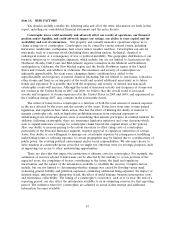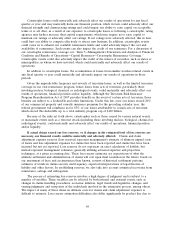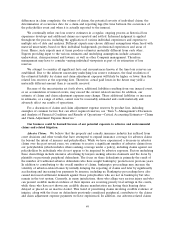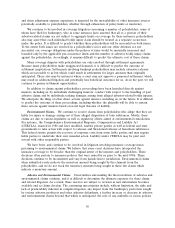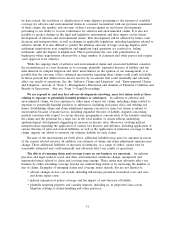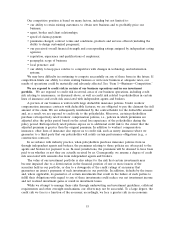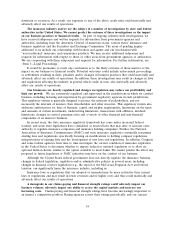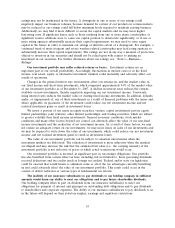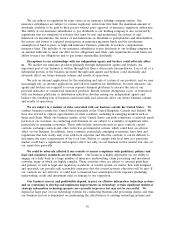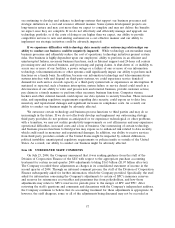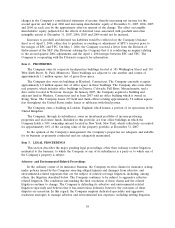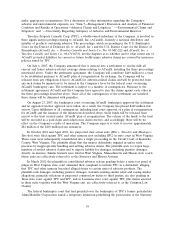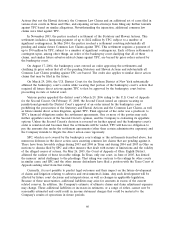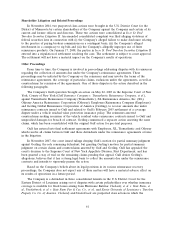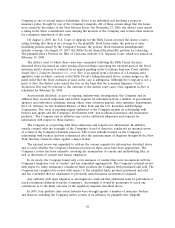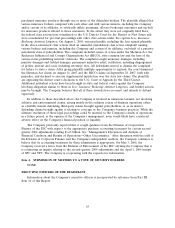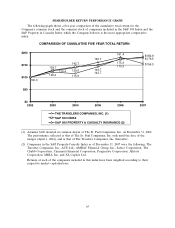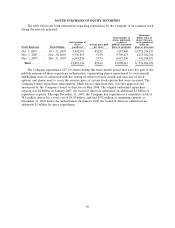Travelers 2007 Annual Report Download - page 68
Download and view the complete annual report
Please find page 68 of the 2007 Travelers annual report below. You can navigate through the pages in the report by either clicking on the pages listed below, or by using the keyword search tool below to find specific information within the annual report.We are subject to regulation by some states as an insurance holding company system. Our
insurance subsidiaries are subject to various regulatory restrictions that limit the maximum amount of
dividends available to be paid to their parent without prior approval of insurance regulatory authorities.
The ability of our insurance subsidiaries to pay dividends to our holding company is also restricted by
regulations that set standards of solvency that must be met and maintained, the nature of and
limitation on investments, the nature of and limitations on dividends to policyholders and shareholders,
the nature and extent of required participation in insurance guaranty funds and the involuntary
assumption of hard-to-place or high-risk insurance business, primarily in workers’ compensation
insurance lines. The inability of our insurance subsidiaries to pay dividends to our holding company in
an amount sufficient to meet our debt service obligations and other cash requirements could harm our
ability to meet our obligations and to pay future shareholder dividends.
Disruptions to our relationships with our independent agents and brokers could adversely affect
us. We market our insurance products primarily through independent agents and brokers. An
important part of our business is written through less than a dozen such intermediaries. Loss of all or a
substantial portion of the business provided through such agents and brokers could materially and
adversely affect our future business volume and results of operations.
We rely on internet applications for the marketing and sale of certain of our products, and we may
increasingly rely on internet applications and toll-free numbers for distribution. In some instances, our
agents and brokers are required to access separate business platforms to execute the sale of our
personal insurance or commercial insurance products. Should internet disruptions occur, or frustration
with our business platforms or distribution initiatives develop among our independent agents and
brokers, the resulting loss of business could materially and adversely affect our future business volume
and results of operations.
We are subject to a number of risks associated with our business outside the United States. We
conduct business outside the United States primarily in the United Kingdom, Canada and Ireland. We
have also started to explore opportunities in other countries, including in emerging markets such as
India and China. While our business outside of the United States currently constitutes a relatively small
portion of our revenues, in conducting such business we are subject to a number of significant risks,
particularly in emerging economies. These risks include restrictions such as price controls, capital
controls, exchange controls and other restrictive governmental actions, which could have an adverse
affect on our business. In addition, some countries, particularly emerging economies, have laws and
regulations that lack clarity and, even with local expertise and effective controls, it can be difficult to
determine the exact requirements of the local laws. Failure to comply with local laws in a particular
market could have a significant and negative effect not only on our business in that market but also on
our reputation generally.
We could be adversely affected if our controls to ensure compliance with guidelines, policies and
legal and regulatory standards are not effective. Our business is highly dependent on our ability to
engage on a daily basis in a large number of insurance underwriting, claim processing and investment
activities, many of which are highly complex. These activities often are subject to internal guidelines
and policies, as well as legal and regulatory standards. A control system, no matter how well designed
and operated, can provide only reasonable assurance that the control system’s objectives will be met. If
our controls are not effective, it could lead to financial loss, unanticipated risk exposure (including
underwriting, credit and investment risk) or damage to our reputation.
Our business success and profitability depend, in part, on effective information technology systems
and on continuing to develop and implement improvements in technology; certain significant multiyear
strategic information technology projects are currently in process but may not be successful. We
depend in large part on our technology systems for conducting business and processing claims, and thus
our business success is dependent on maintaining the effectiveness of existing technology systems and
56



